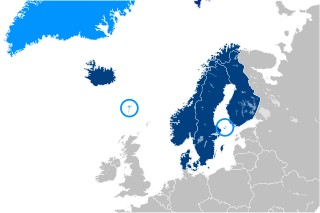Related Research Articles

The Canada Health Act is a statute of the Parliament of Canada, adopted in 1984, which establishes the framework for federal financial contributions to the provincial and territorial health insurance programs, commonly called "medicare". To receive federal funding, the provinces and territories must comply with the terms of the CHA, which establishes the principle of universal, single-payer healthcare.

A nursing home is a facility for the residential care of elderly or disabled people. Nursing homes may also be referred to as skilled nursing facility (SNF), long-term care facilities, old people's homes, assisted living facilitiescare homes, rest homes, convalescent homes or convalescent care. Often, these terms have slightly different meanings to indicate whether the institutions are public or private, and whether they provide mostly assisted living, or nursing care and emergency medical care. Nursing homes are used by people who do not need to be in a hospital, but cannot be cared for at home. The nursing home facility nurses have the responsibilities of caring for the patients' medical needs and also the responsibility of being in charge of other employees, depending on their ranks. Most nursing homes have nursing aides and skilled nurses on hand 24 hours a day.
Special education is the practice of educating students in a way that accommodates their individual differences, disabilities, and special needs. This involves the individually planned and systematically monitored arrangement of teaching procedures, adapted equipment and materials, and accessible settings. These interventions are designed to help individuals with special needs achieve a higher level of personal self-sufficiency and success in school and in their community, which may not be available if the student were only given access to a typical classroom education.

The Department for Work and Pensions (DWP) is a department of His Majesty's Government responsible for welfare, pensions and child maintenance policy. As the UK's biggest public service department it administers the State Pension and a range of working age, disability and ill health benefits to around 20 million claimants and customers. It is the second largest governmental department in terms of employees, and the largest in terms of expenditure (£187bn).
Care in the Community is a British policy of deinstitutionalisation, treating and caring for physically and mentally disabled people in their homes rather than in an institution. Institutional care was the target of widespread criticism during the 1960s and 1970s, but it was not until 1983 that the government of Margaret Thatcher adopted a new policy of care after the Audit Commission published a report called 'Making a Reality of Community Care' which outlined the advantages of domiciliary care.
Independent living (IL), as seen by its advocates, is a philosophy, a way of looking at society and disability, and a worldwide movement of disabled people working for equal opportunities, self-determination, and self-respect. In the context of eldercare, independent living is seen as a step in the continuum of care, with assisted living being the next step.

Harold Wilson was appointed Prime Minister of the United Kingdom by Queen Elizabeth II on 16 October 1964 and formed the first Wilson ministry, a Labour government, which held office with a thin majority between 1964 and 1966. In an attempt to gain a workable majority in the House of Commons, Wilson called a new election for 31 March 1966, after which he formed the second Wilson ministry, a government which held office for four years until 1970.

Child protection is the safeguarding of children from violence, exploitation, abuse, and neglect. Article 19 of the UN Convention on the Rights of the Child provides for the protection of children in and out of the home. One of the ways to ensure this is by giving them quality education, the fourth of the United Nations Sustainable Development Goals, in addition to other child protection systems.
Person-centred planning (PCP) is a set of approaches designed to assist an individual to plan their life and supports. It is most often used for life planning with people with learning and developmental disabilities, though recently it has been advocated as a method of planning personalised support with many other sections of society who find themselves disempowered by traditional methods of service delivery, including children, people with physical disabilities, people with mental health issues and older people. PCP is accepted as evidence based practice in many countries throughout the world.
The Housing Grants, Construction and Regeneration Act 1996 is an Act of Parliament of the United Kingdom. Its long title shows that it is a piece of omnibus legislation:
Carers' rights are rights of unpaid carers or caregivers to public recognition and assistance in preventing and alleviating problems arising from caring for relatives or friends with disabilities. The carers' rights movement draws attention to issues of low income, social exclusion, damage to mental and physical health identified by research into unpaid caregiving. In social policy and campaigning the movement distinguishes such people's situation from that of paid careworkers, who in most developed countries have the benefit of legal employment protection and rights at work. With an increasingly ageing population in all developed societies, the role of carer has been increasingly recognized as an important one, both functionally and economically. Many organizations which provide support for persons with disabilities have developed various forms of support for carers/caregivers as well.
Special educational needs (SEN), also known as special educational needs and disabilities (SEND) in the United Kingdom refers to the education of children who require different education provision to the mainstream system.
In England, social care is defined as the provision of social work, personal care, protection or social support services to children or adults in need or at risk, or adults with needs arising from illness, disability, old age or poverty. The main legal definitions flow from the National Health Service and Community Care Act 1990, with other provisions covering disability and responsibilities to informal carers. That provision may have one or more of the following aims: to protect people who use care services from abuse or neglect, to prevent deterioration of or promote physical or mental health, to promote independence and social inclusion, to improve opportunities and life chances, to strengthen families and to protect human rights in relation to people's social needs.
No Secrets, also known coequally as Adult Safeguarding, was a UK Government publication from the Department of Health which provided guidance on developing and implementing multi-agency policies and procedures to protect adults deemed "at risk" from harm and/or abuse. Its full title was "No secrets: guidance on developing and implementing multi-agency policies and procedures to protect vulnerable adults from abuse". It has now been replaced by statutory guidance issued under the Care Act 2014.

Social security or welfare in Finland is very comprehensive compared to what almost all other countries provide. In the late 1980s, Finland had one of the world's most advanced welfare systems, which guaranteed decent living conditions to all Finns. Since then social security has been cut back, but the system is still one of the most comprehensive in the world. Created almost entirely during the first three decades after World War II, the social security system was an outgrowth of the traditional Nordic belief that the state is not inherently hostile to the well-being of its citizens and can intervene benevolently on their behalf. According to some social historians, the basis of this belief was a relatively benign history that had allowed the gradual emergence of a free and independent peasantry in the Nordic countries and had curtailed the dominance of the nobility and the subsequent formation of a powerful right wing. Finland's history was harsher than the histories of the other Nordic countries but didn't prevent the country from following their path of social development.
Disability is an issue that directly affects a significant proportion of the population of the United Kingdom. Section6(1) of the Equality Act 2010 defines disability as:
"A person has a disability for the purposes of the Act if he or she has a physical or mental impairment and the impairment has a substantial and long-term adverse effect on his or her ability to carry out normal day-to-day activities."
Professor Lord Darzi's review of the NHS in 2008 introduced the idea of personal health budgets (PHBs) in the English National Health Service. Since October 2014 people eligible for NHS Continuing Healthcare were given the legal right to have a personal health budget. NHS England’s Five Year Forward View called for a ‘major expansion’ of the scheme. NHS Choices describes personal health budgets as a way "to give people with long-term conditions and disabilities greater choice and control over the healthcare and support they receive."
Disabled Facilities Grants are paid under the Housing Grants, Construction and Regeneration Act 1996 for the provision of grant aided adaptations for disabled persons' properties within the UK. From 2020/21 the budget was increased to £573 million.

Social Security Scotland is an executive agency of the Scottish Government with responsibility for social security provision.
The Canada Assistance Plan (CAP) was a financing program created in 1966 by the Pearson government. The CAP consisted of a cost-sharing arrangement between the federal government and provinces, territories and municipalities whereby the federal government would partially fund eligible social programs.
References
Notes
- ↑ CabinetOffice.gov.uk pdf Archived 2007-10-06 at the Wayback Machine
- 1 2 Pearson, C. (ed) (2006) Direct Payments and Personalisation of Care, Edinburgh, Dunedin Academic Press, ISBN 1-903765-62-5
- ↑ Community Care (Direct Payments) Act 1996 (c. 30)
- ↑ Carers And Disabled Children Act 2000
- ↑ Health and Social Care Act 2001 (c. 15)
- ↑ "Direct Payments" . Retrieved 2017-09-11.
- ↑ "Direct payments - what are they" . Retrieved 2017-09-11.
Bibliography
- Leece, J. and Bornat, J. (eds) (2006) Developments in Direct Payments, Bristol: The Policy Press, ISBN 978-1-86134-653-7
- Pearson, C. (ed) (2006) Direct Payments and Personalisation of Care, Edinburgh, Dunedin Academic Press, ISBN 1-903765-62-5